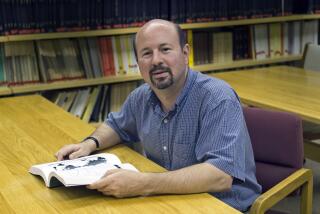Accepting Criticism, Annan Seeks to Make Use of It
- Share via
UNITED NATIONS — Secretary-General Kofi Annan accepted responsibility Wednesday for allowing corruption and abuses in the Iraq oil-for-food program as investigators presented a massive report on the problems after 16 months of work. But he quickly sought to use the panel’s call for sweeping change as a catalyst for his own proposals to reform the world body.
Although the report stops short of calling for Annan’s resignation, diplomats say the real test of whether the secretary-general has salvaged his credibility may come next week when world leaders gather at the United Nations to consider broad institutional and policy changes that he hopes will be his legacy.
“He has to show that he can still be the leader of reform,” said one U.N. official, speaking on the condition he not be named. “If not, then he might as well get out of the way.”
The U.N. inquiry into the Iraq relief program concluded that although there was no evidence of personal wrongdoing by Annan, he and the Security Council failed to curb abuses of the program by U.N. staffers, contractors and especially Saddam Hussein. The Iraqi leader managed to amass $1.7 billion in kickbacks from companies in the program and $11 billion from smuggling oil, the report estimates.
Presenting the committee’s 847-page report to the Security Council, the panel’s chairman, former U.S. Federal Reserve Chairman Paul Volcker, said that investigators had been asked to look for maladministration or corruption in the oil-for-food program. “Unhappily, we found both,” he said.
The performance of Annan and his deputy, Louise Frechette, “fell short of the standards that the United Nations organization should strive to maintain,” Volcker said.
“The inescapable conclusion,” the report says, is that the U.N. “needs thoroughgoing reform -- and needs it urgently.”
Addressing the Security Council after Volcker, Annan said that he accepted the panel’s personal criticism of his failure to manage the program and said he deeply regretted not looking deeper into reports that his son was exploiting U.N. connections for personal gain.
“The findings in today’s report must be deeply embarrassing to all of us. The Inquiry Committee has ripped away the curtain and shone a harsh light into the most unsightly corners of the organization,” Annan said to the council as Volcker quietly catnapped in a chair near him.
In a statement that at once shared the blame and transformed Volcker’s call for comprehensive change to support his own reform package, Annan said: “None of us -- member states, Secretariat, agencies, funds or programs -- can be proud of what it has found. Who among us can now claim that U.N. management is not a problem, or is not in need of reform?”
Annan’s credibility has been damaged by months of revelations about corruption related to the program, but on Wednesday, as he has in the past, he dismissed calls for his resignation by U.N. critics. “I don’t anticipate anyone to resign. We are carrying on with our work.”
The secretary-general has proposed a package of policy changes in development, security and the U.N.’s management that he hoped would restore the world body’s relevance.
But just a week before more than 175 world leaders are due to vote on the reforms, the package is stalled in negotiations, with a group of developing countries and others resisting proposals pushed largely by the United States.
“If we don’t have an agreement by Friday, then you can call it a crisis,” said Dutch Ambassador Dirk Jan van den Berg.
U.S. Ambassador John R. Bolton agreed with Annan that the Volcker report underlined the urgency of reforming the world body.
“We need to reform the U.N. in a manner that will prevent another oil-for-food scandal. The credibility of the U.N. depends on it,” Bolton said.
Asked whether Annan should quit, Bolton simply smiled and waved. But he said that “the member governments are going to lead the reform,” not the secretary-general -- a signal taken by some diplomats here that Annan may have to relinquish some of his clout to stay in office.
Annan and U.N. officials hoped that Wednesday’s report would end months of speculation about whether he helped steer a contract to his son’s employer, Cotecna Inspection. The panel found that there was no evidence that Annan influenced the contract, and inadequate evidence to show that he knew about the Swiss company’s bid.
The committee did, however, document how Annan’s son Kojo obtained information about the contract Cotecna was bidding on through family friends in the procurement department whom he described to his boss as “my people in New York.”
Kojo also exploited his father’s diplomatic status to save more than $20,000 on a Mercedes-Benz SUV, by receiving a “diplomatic discount” and avoiding import duties when he shipped the car to his home country, Ghana.
The report suggests that the secretary-general assisted his son, citing a note that Annan’s secretary left for him saying that Kojo had asked for a U.N. letter stating the car was for Annan’s use.
Fallout from the Volcker inquiry may continue for one more month. A final report in October is expected to detail the companies that did business with Iraq under the program and participated in kickback schemes that netted Hussein billions.
More to Read
Sign up for Essential California
The most important California stories and recommendations in your inbox every morning.
You may occasionally receive promotional content from the Los Angeles Times.










